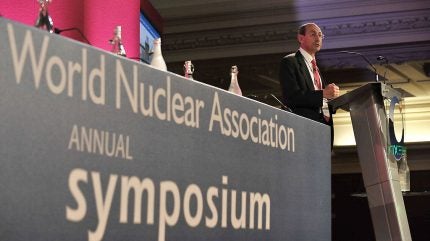
Last year, Italy – the only G8 country without its own operational nuclear power plant – took the first steps towards reversing its ban on nuclear power, which has been in place for nearly four decades.
Italy once had four operational nuclear reactors, but all were shut down in 1987 after the catastrophic Chernobyl disaster saw public opinion turn against the energy source.
Ever since then, the Italian Government has on occasion pushed for nuclear power’s return but with limited success. Support for the energy source seemed to come to a head in 2008 when the government announced plans to have 25% of the country’s electricity supplied by nuclear power. This too, however, was rejected in a referendum after the Fukushima disaster in 2011.
Finally, in May last year, the country’s lower house of parliament passed two motions aimed at reversing the ban. The text merely requested the government to “consider including nuclear power as an alternative and clean source of energy production”.
This intent now seems likely to turn into action with Italy’s Energy Minister Gilberto Pichetto Fratin announcing last month plans to draft legislation by early 2025 to reverse the ban, with hopes of government approval in the course of next year.
Henry Preston, spokesperson for the World Nuclear Association, expressed his support for this decision, telling Power Technology that the nuclear revival is imperative for the country.
The significance of the reversal
“Italy reversing its ban on nuclear energy would be significant for its energy transition and carbon neutrality ambitions,” Preston says, emphasising nuclear’s ability to provide “clean, reliable and secure electricity and heat, which can decarbonise many domestic and industrial applications”.
Italy, like many countries across the world, has attempted to accelerate its decarbonisation initiatives in recent years. For instance, the country will no longer grant concessions for oil exploration and production, although the ban will only apply to new concessions, not ones that have received government approval. It also plans to abandon coal-fired electricity by the end of 2025.
While these efforts have been praised among environmentalists, critics have raised concerns over the future of the European nation’s energy security.
Preston believes that nuclear will be the answer: “There are no cases of countries without access to vast natural resources of geothermal or hydropower that have managed to significantly reduce fossil fuels from their energy supply without deploying nuclear energy.”
He explains that Italy’s plans are in line with other nations, namely Belgium, France, Sweden, South Korea and Switzerland, that are also planning to revive their nuclear industries.
Italy’s nuclear plans: from SMRs to a state-backed nuclear company
Despite the decades-long ban, Italy has retained key expertise in the nuclear sector.
“Italy has a long tradition with nuclear energy and is home to nuclear pioneers such as Enrico Fermi, and built and safely operated reactors in the 20th century,” Preston says.
“Since phasing out its past generating reactors, Italy has maintained high level of expertise in training personnel and manufacturing capabilities that support many other European countries utilising nuclear energy, and is involved in the development of new SMRs [small modular reactors].”
Indeed, many Italian energy companies have pursued nuclear developments outside the country. State-controlled utility company Enel operates nuclear power stations in Spain, while Eni has invested in a project developing nuclear fusion in the US.
Edison, the Italian subsidiary of French nuclear group EDF, is also working on the development of SMRs. Fratin has said these SMRs could be introduced into Italy’s energy mix by 2035.
SMRs are particularly attractive to Italy, as they have a relatively small footprint compared to other technologies such as wind and solar and can be constructed in years, rather than decades.
In addition, alongside legislation to overturn the country’s nuclear ban, the government is reportedly planning to create a state-backed nuclear power firm.
According to multiple US media reports, Italian officials have begun preliminary discussions with Ansaldo, Enel and Newcleo to develop the firm.
Italian Prime Minister Giorgia Meloni’s Energy and Climate Plan estimates that, if all plans for the nuclear revival were to proceed, nuclear power could make up 11% of the country’s domestic energy demand by 2050.



